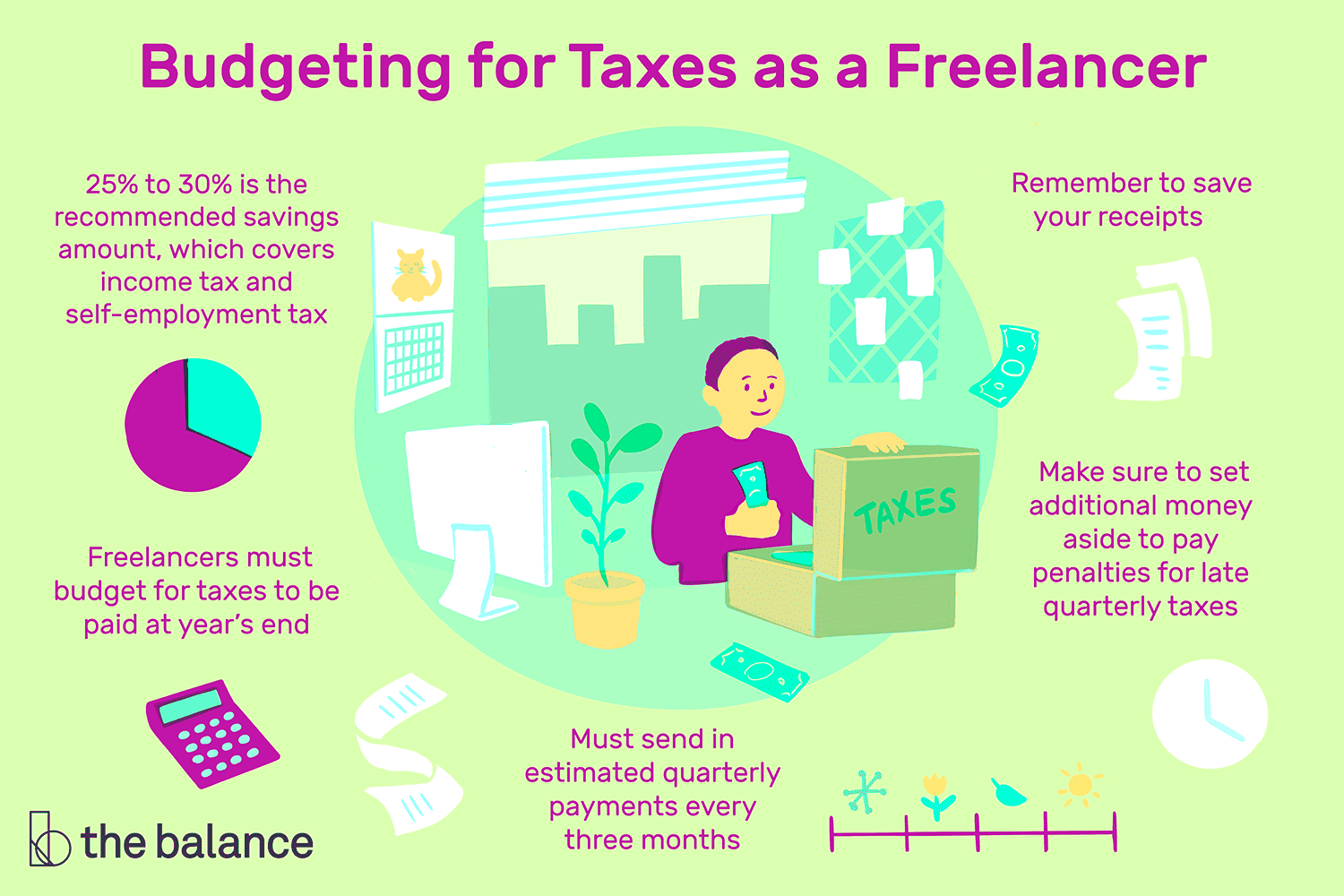When I embarked on my freelancing journey the initial sense of freedom was amazing – until tax season rolled in. I hadn't quite considered that unlike regular jobs freelancers don't have taxes taken out of each paycheck. The realization hit me hard that I needed to be ready for it. Many freelancers overlook this crucial aspect and the sudden awareness can be quite daunting. That's why it's essential to begin setting aside money for taxes right from the start. It's not driven by fear but rather about being wise and accountable, with your finances.
Freelancers have to handle their own taxes unlike people on a salary. It's not something you can easily forget about. Here's why it's important.
- No automatic deductions: You won’t have taxes taken out automatically. If you don’t plan ahead, you could be left scrambling for funds when the taxman comes knocking.
- Unexpected penalties: Not saving can result in hefty fines and penalties. Trust me, it's no fun dealing with those unexpected charges.
- Tax obligations vary: Freelancers are subject to income tax, self-employment tax, and possibly local taxes, all of which add up fast if you aren’t prepared.
Understanding How Freelance Taxes Work

I was taken aback when I discovered the variety of taxes that freelancers have to deal with. Freelancers are liable for income tax and self employment tax. That’s what really surprised me. The self employment tax includes contributions to Social Security and Medicare which I used to overlook when I was employed in a traditional job. Grasping this concept can help avoid a lot of hassles down the road.
Here’s a brief overview of the process for handling freelance taxes.
| Type of Tax | What It Covers |
|---|---|
| Income Tax | Your federal and state income, depending on where you live. |
| Self-Employment Tax | Social Security and Medicare contributions that an employer would normally withhold. |
Grasping these tax obligations assists you in determining the amount you should set aside. The government views freelancers as both workers and business owners, hence the reason we incur a tax rate. However once you have an idea of what to anticipate it becomes simpler to budget accordingly. Its crucial to familiarize yourself with the regulations applicable to your country or state as well. Tax rates can vary based on your area so it’s essential to stay up to date with the latest information.
Also Read This: How to Get Your First Work on Fiverr
Setting Aside a Percentage of Your Income

I discovered through experience that putting aside money for taxes is not something you can skip. These days I make it a point to reserve a portion of my income right from the beginning. It can be tempting to use up your entire income as it arrives, especially since freelancing can be quite unpredictable. However believe me when I say that saving up some cash will spare you a lot of trouble down the line.
A helpful guideline is to set aside about 25 to 30% of your earnings for tax purposes. It may seem like a chunk of money, but keep in mind that this includes both income tax and self employment tax.
- Open a separate savings account: I created a dedicated account just for taxes. It helps keep things organized, and I never accidentally dip into it.
- Be consistent: Make it a habit to transfer money every time you get paid. Don’t wait until the end of the month. By then, you might be tempted to spend it.
- Adjust based on earnings: Freelance income fluctuates, so if you make more one month, save more. On lighter months, you might have less to set aside, but never skip it entirely.
Establishing this routine brings a sense of calm and helps you steer clear of the stress that comes with rushing to settle your tax dues as the deadline approaches.
Also Read This: How Fiverr Works for Sellers: A Comprehensive Guide
Keeping Track of Your Business Expenses

When I started freelancing I quickly grasped the significance of tracking every single expense. Initially I was somewhat lax believing that a few minor costs wouldn’t matter much. However when tax season rolled around it felt like digging through sand trying to remember my expenditures on subscriptions, travel or even office supplies. Honestly it was quite chaotic. That’s when it hit me; it’s not only about earning money but also about handling it wisely.
In order to ensure you dont overlook any deductions heres my current method for keeping tabs on business expenses.
- Use a spreadsheet or accounting software: I started simple with a spreadsheet and then moved on to accounting tools like QuickBooks. Honestly, once you get the hang of it, it’s a game-changer. You can easily categorize expenses like office supplies, travel, or software subscriptions.
- Save every receipt: This one is huge. Even if it’s just a cup of coffee bought for a client meeting, I keep the receipt. I’ve found that scanning receipts into a folder on my computer or using a receipt tracking app helps keep everything in one place.
- Separate personal and business expenses: I made the mistake of mixing them up at first, and untangling them later was a nightmare. Now, I have a separate bank account and credit card for business expenses. It makes life so much easier.
Keeping tabs on your spending may feel like a chore, but it pays off. When tax season rolls around those small deductions can really add up. And being organized helps ease a lot of future stress too.
Also Read This: What Freelance Voice Actors Typically Earn
Choosing the Right Tools for Tax Planning
I’ve learned that being a freelancer is about being efficient rather than putting in more effort. This holds true when it comes to handling taxes as well. Using the tools can make the tax process feel less overwhelming and more controllable. In the past I used to feel confused during tax season but then I came across some helpful tools that keep me organized. Selecting the ones can save you both time and money, in the future.
Here are a few tools I found useful:
- Accounting Software: Software like FreshBooks or QuickBooks does wonders. They handle everything from tracking income and expenses to generating reports. It’s like having a personal accountant without the high fees.
- Tax Calculators: I’ve found tax calculators, like those offered by TurboTax or even simple online calculators, super helpful for estimating what I owe. They give a clearer picture, so there are no surprises at the end of the year.
- Tax Filing Tools: Platforms like TurboTax or H&R Block are great for filing your taxes. They walk you through the process, step by step, which can be a huge relief, especially when you’re unsure about the forms and deductions.
When all is said and done having the tools in hand not only makes tax filing smoother but also keeps you organized year round. As someone balancing various projects and clients these resources are a true blessing. They’ve alleviated much of the anxiety and pressure that used to accompany the tax season rush.
Also Read This: What Does Commercial Use Mean on Fiverr?
Setting Up Quarterly Tax Payments
If you’re curious about the process, here’s what I’ve discovered:
- Estimate your taxes: The first step is estimating how much you’ll owe for the year. This involves looking at your previous income and using online calculators or talking to a tax advisor. I personally use a tax software that helps with these estimates, and it’s been pretty accurate so far.
- Mark the deadlines: Quarterly taxes are due four times a year – April, June, September, and January. Mark these on your calendar, so you never miss a payment. Missing these can lead to penalties, and no one wants that!
- Pay online: I found that paying through the IRS or state tax websites is the easiest option. It’s fast, and you get an immediate confirmation, which gives peace of mind. Plus, it helps me stay on track with my payments.
While it may seem like an hassle to arrange payments every three months, it can be beneficial in managing your tax obligations by preventing you from facing a hefty bill all at once. Over time it contributes to better financial stability for you.
Also Read This: Understanding Seller Levels on Fiverr
Common Mistakes Freelancers Make When Saving for Taxes
When I embarked on my journey as a freelancer I made numerous blunders with my taxes that I eventually lost track of. Getting swept up in the thrill of being your own boss can make you overlook the fact that taxes won’t manage themselves. It was only when I had to tap into my savings to handle an unexpected tax bill that I truly understood the importance of taking this matter seriously. Through the years I’ve picked up a few lessons although not without facing some challenges along the way.
Here are a few errors that freelancers frequently commit when it comes to setting aside money for taxes.
- Not saving enough: This is one of the biggest mistakes I made. In the beginning, I didn’t set aside enough money because I underestimated how much I’d owe. It’s easy to think that a smaller income means smaller taxes, but that’s not always the case, especially with self-employment tax.
- Mixing personal and business finances: I cannot stress this enough. Mixing your personal and business finances is a recipe for disaster. It makes it so much harder to track your income and expenses properly, and you might miss out on legitimate tax deductions.
- Ignoring deadlines: Freelancers are expected to pay taxes quarterly, but many forget this, thinking they can just pay once a year like a regular employee. I missed a quarterly payment once, and the penalties were brutal. Set reminders, so you don’t end up in the same boat.
- Overlooking deductions: Early on, I missed out on so many deductions simply because I didn’t keep track of expenses or didn’t know what counted as a deduction. Things like home office expenses, equipment, and even internet bills can help lower your taxable income if documented properly.
Steering clear of these blunders can help you save cash and ease during tax season. The better prepared you are the more seamless the entire process will unfold.
Also Read This: How to Set Up an Account on Fiverr
FAQ
Q: How much should I set aside for taxes as a freelancer?
A solid guideline is to allocate around 25 to 30% of your earnings. This should be sufficient to take care of your income tax and self employment tax. Keep in mind though that this percentage may differ based on where you live and how much you earn. Its wise to seek advice from a tax expert to get tailored recommendations for your situation.
Q: Do I really need to pay quarterly taxes?
If you think you’ll owe at least 1,000 in taxes when the year ends the IRS mandates that you make quarterly payments. It’s wiser to distribute your payments throughout the year instead of dealing with a hefty amount all at once, in the end.
Q: What expenses can I deduct as a freelancer?
You can subtract costs that are directly tied to your business such as office materials, internet, software subscriptions and even a share of your rent if you operate a home office. Its crucial to maintain meticulous records of all your business expenditures.
Q: What happens if I don’t save enough for taxes?
Failing to set aside sufficient funds might force you to tap into your savings or secure a loan to settle your tax dues. Additionally you could incur penalties for not paying enough which would further increase your outstanding balance.
Conclusion
Saving for taxes as a freelancer might feel like a daunting challenge at first but believe me it becomes easier once you turn it into a routine. I recall the stress I used to experience whenever tax season approached. Nowadays with some preparation and careful management of my finances it feels more manageable. Putting aside money consistently monitoring expenses and utilizing tools can alleviate a lot of the pressure. It's one less concern to deal with when you're already balancing numerous aspects of freelance life. The peace of mind it brings is invaluable along with steering clear of those hefty penalties!




